#i use the anti mediation app thank you very much
Explore tagged Tumblr posts
Text
Had a nightmare where someone asked me, "oh, you meditate? What app do you use?"
7 notes
·
View notes
Text
Careless whispers
In a previous post we mentioned the story of the infamous conflict between King Henry II and Thomas Becket, the Archbishop of Canterbury, in 12th century England. It’s a familiar story of two powerful and egotistical men clashing over issues of status and pride. After a series of altercations over clerical privilege, Henry finally loses his temper; what he actually said to the assembled courtiers has been lost to history, but the most likely version comes from the biographer-monk Edward Grim, who recorded it as follows:
What miserable drones and traitors have I nourished and brought up in my household, who let their lord be treated with such shameful contempt by a low-born cleric?
Whatever Henry said, four of his knights (Richard le Breton, Reginald FitzUrse, Hugh de Morville, and William de Tracy) interpreted the utterance as a royal command. They rode to the Normandy coast, took ship for England, and confronted the Archbishop. What happened next was described by the aptly named Grim, who was on the scene and actually wounded in the attack:
The wicked knight, fearing lest Becket should be rescued by the people and escape alive, leapt upon him suddenly and wounded this lamb who was sacrificed to God, cutting off the top of the crown which the sacred unction of the chrism had dedicated to God.
More terrible blows followed, and eventually the Archbishop succumbed. Was the king’s statement interpreted correctly? We’ll never know. But we can perhaps read parallels to our own time in the complex motivations and agendas that informed the knights’ collective decision to commit murder.

Another story, more recent. This one takes place in Dallas, Texas, where a six-year-old girl asked her family’s Amazon Echo: ‘Alexa, can you play dollhouse with me and get me a dollhouse?’ Alexa promptly complied, ordering a $300 KidKraft Sparkle Mansion doll’s house from one of Amazon’s suppliers. She also ordered (for reasons known only to the internal logic of the system) nearly two kilograms of sugar cookies. The story doesn’t stop there: the following day, when a San Diego news programme reported the story, a number of Echos were roused by the wake word ‘Alexa’ coming from proximate television sets, and they in turn followed the command to also purchase dolls’ houses.
What inspired Alexa to order the biscuits? A flawed system or a very smart one?
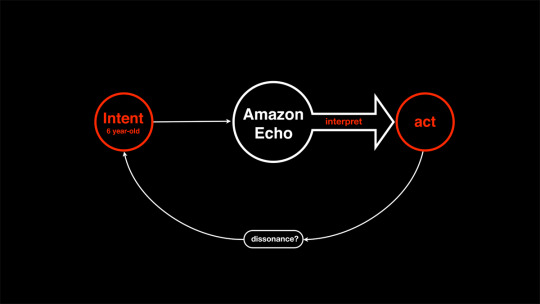
In 560 BC, King Croesus of Lydia set a challenge to the world’s oracles to determine who provided the most accurate prophecies. His emissaries were sent to seven sites to ask the resident oracle what the king was doing at that precise moment. The winner was the Oracle of Delphi, who correctly reported that the king was making a lamb-and-tortoise stew.
Oracles were seen as conduits to the gods, speaking and giving advice on their behalf. Divination came in many other forms: augurers would follow the flight paths of birds (legend has it that the location of Rome was decided through this approach). Haruspices would read the entrails of sacrificed animals. Today, however, reading the future is much less exotic or gruesome, being mostly about data and statistics.
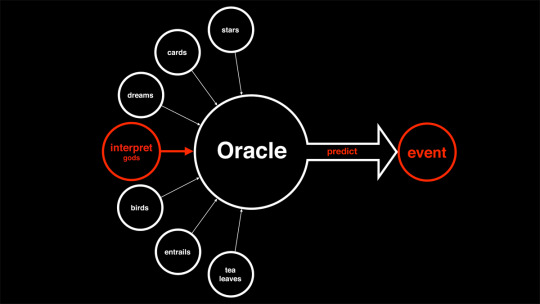
The next story starts back to front. A man walks into a Target outside Minneapolis and demands to see the manager. He’s got a handful of targeted coupons that had been sent to his teenage daughter, and he’s angry. ‘My daughter got this in the mail!’ he said. ‘She’s still in high school, and you’re sending her coupons for baby clothes and cribs? Are you trying to encourage her to get pregnant?’ In fact the daughter actually is pregnant. Target knows it before the girl’s father, thanks to a hunch based on its analysis of online searches and product purchases - in this case a particular lotion often used by pregnant women in the second trimester.
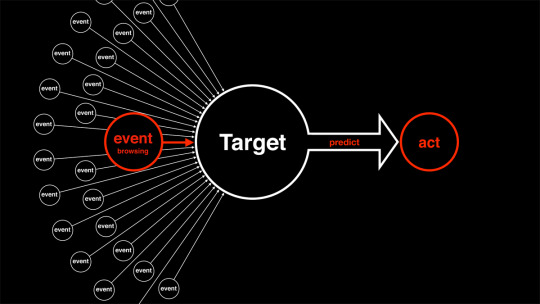
One more story. In happier times for Facebook, the social media giant played a significant - if unevenly distributed and still debated - role in the Arab Spring by facilitating communication between protesters. The April 6 Youth Movement in Egypt, for example, used Facebook to launch a successful call for protests in the aftermath of the Tunisian Revolution that preceded the spread of uprisings across North Africa and the Middle East in 2011-12. Events of the Arab Spring demonstrated that social networks provide a perfect mechanism through which to disseminate information broadly and quickly, as long as you have access to the internet.
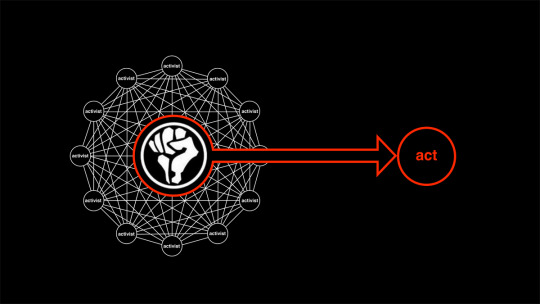
So far this is a familiar and well-trodden tale; the more interesting story, however, happened when Arab states began to shut down internet access. Activists in Cairo found the solution in a different kind of social network - not screen-based, but via the city's taxi drivers. The activists realised that if they could direct conversations towards the planned anti-Mubarak gathering on 25 January 2011 in Tahrir Square, taxi drivers might spread the word and the protest would be a success. Initially, the activists tried to talk directly to drivers.
But they soon discovered that due to the highly politicised nature of their subject, conversations would quickly turn into arguments rather than dissemination, and their objective would fail. The solution was found in exploiting the human tendency to gossip. Instead of engaging in direct conversation, the activists allowed the taxi drivers to overhear a mobile phone conversation where they would disclose the details of the protests. The taxi drivers eavesdropped, and believing they had overheard a gossip-worthy secret, they began to spread the message.
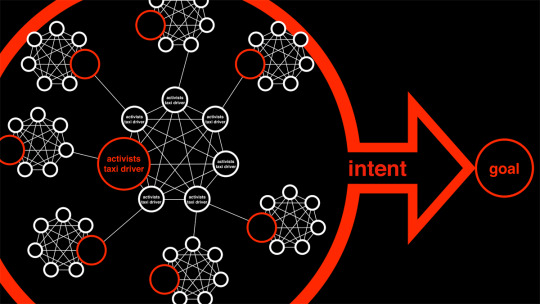
‘Technology is making gestures precise and brutal, and thereby human beings.’ - Adorno
In one of our very first posts, The Pleasures of Prediction, we described the daily experience at our local cafe - where the gestures of interaction were not always precise, sometimes brutal (depending on the mood of either ourselves or the people behind the counter), but mostly genial and surprisingly seamless. More recently, our colleague was telling us how his landlady keeps track of the number of bottles of alcohol he consumes each week by counting his recycling - a sort of small island version of a fitness tracker like the Fitbit. ‘She’s not judgemental’, he said. ‘Well … not really.’ Of course surveillance and tracking - mediating, amplifying, interpreting - have always been present in society; in the past they were just more social, or at least more analogue.
These examples raise some big questions, such as: Would you rather be monitored by a human being or a machine? If machine, why? Why don’t we trust humans? For that matter, why don’t we trust ourselves? How have we been shown to be untrustworthy and unable to control our own self-destructive or anti-social impulses? For the past two years we have been collecting stories that relate to the interpretation of information - tracing the shift from human beings to technological mediation as translator and interpreter; who is making important decisions, on whose behalf, and why.
There is certainly precision and brutality in Cambridge Analytica’s use of Facebook data for micro-targeting and psychological profiling. Likewise Amazon Echo, a data-based Trojan horse mediating our personal lives in increasingly precise but also brutal ways. There is a tendency to understand and evaluate technology according to old-fashioned notions of progress: faster, easier, more efficient and so on. But digitisation, the data that it creates, and the vast networks of dissemination also facilitate the augmenting of darker aspects of human behaviour, targeting our deepest vulnerabilities. How we examine the implications, embrace the ethics, and understand the complexity of these systems are some of the fundamental challenges we face.
Real Prediction Machines
Shortly before the Echo appeared on the market in 2014, Real Prediction Machines addressed many of the issues Amazon’s new device (and others like it) would raise. The speculative project was developed by James Auger in collaboration with designer Jimmy Loizeau, artist Alan Murray, and Edinburgh University data scientist Ram Ramamoorthy, who at the time was developing predictive modelling systems combined with machine learning to predict when professional athletes might sustain an injury through overtraining.
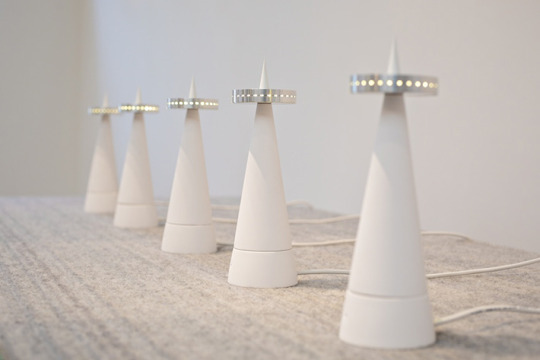
James, Jimmy and Alan began by asking Ram what kind of other things might be predictable through such techniques, such as ‘Will my child become a professional football player’, ‘Will Labour win the next general election’, and ‘Will I suffer a heart attack?’ The words inside the circles of the Bayesian network diagram represent potential variables. In relation to a heart attack they could correspond to something like diet or exercise, the data coming from a supermarket loyalty card, or the accelerometer in your smartphone. Or more finite information such as family history, for example data coming from a genetic testing service like 23andMe.
These variables combine to create a live and ongoing feed into the predictive algorithm. The heart attack example seemed a little too banal due to its obvious connection to wellbeing and the huge growth of data and tracking methods, so the group suggested another question to Ram: Will I have a domestic argument?
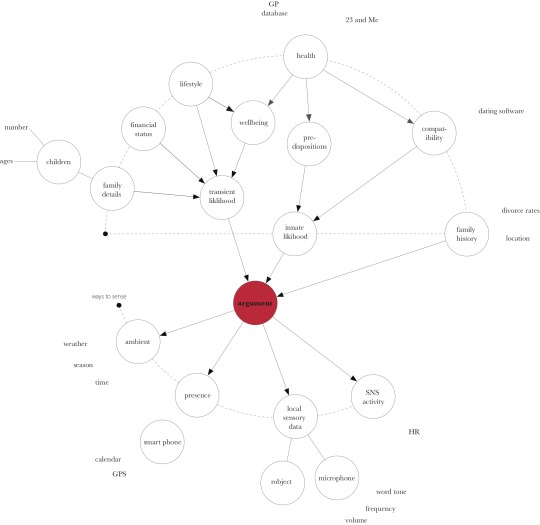
The Bayesian network shown above looks similar to the earlier one, but in this instance a microphone was added for live sound input (anticipating the omnipresent Echo). Using machine learning, the system would become better at predicting arguments through the statistical analysis of keywords, tone, and frequency - identifying particular subjects that a couple might commonly fight about.
The output was translated into an object - not an app but something more symbolic, sympathetic. They settled on an ambient device sitting in the background, providing information when you might need it.
The device essentially has three states:
Clockwise means that the argument is moving into the future;
Anti-clockwise means that the argument is approaching, and the slower the rotation the more imminent it is;
When the rotating stops, the argument starts.
Projects like Real Prediction Machines work when it is not completely clear whether the idea is a ‘good’ one or not. Is it too invasive? Is it genuinely helpful? This is how we should think about all potential technologies, but we rarely do.
What happens next? How far away are we from Alexa ordering not biscuits, but a councillor? How much control will we have in the future, and how much do we want to have?
Images:
All diagrams by James Auger; photo of Real Prediction Machines by Sophie Mutevelian.
13 notes
·
View notes